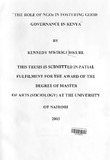| dc.description.abstract | The study on the 'Role of NGOs in Fostering Good Governance in Kenya' aimed at investigating the factors that influence the ability of NGOs to foster good governance in the Kenyan society. Specifically, the study aimed at investigating four aspects namely, structures and activities of NGOs, NGO - government relations, NGO-donor relations and grassroots representation as they influence ability of NGOs to foster good governance in
Kenya. The study was based in Nairobi Kenya from where 24 NGOs were selected. From the 24 NGOs the study drew 134 respondents who together with 15 key informants provided the primary data analyzed. Primary data sources were reinforced with data gathered through secondary methods including document and media report analysis. Analysis of the study data was accomplished through quantitative techniques using the statistical package for social science (SPSS) computer program and transcription and collapsing of qualitative data.
Findings from the study point to high potential for NGOs in playing a role to foster good governance in Kenya. However NGOs have not hitherto done so because their efforts are not adequately tied to the aspirations and efforts of grassroots communities. According to the findings, this potential has not hitherto been utilized maximally because NGOs are found to be limited by aspects in the factors studied. NGO structures and activities are found by the study not to have fostered adequate Practices of teamwork and open consultation were found to be diminished and NGOs are found not to adequately foster capacity building at the grassroots through promoting strong grassroots organizations and empowerment. They are also found not to be all inclusive
associations and not to foster accountability to and among the people they serve and the government. The study also establishes that there are many instances of lapses in accountability in NGOs. NGOs are also found to be weak in other structural aspects such as conflict management and resolution and problem solving.
The study also established that increasing numbers of NGOs are moving to cooperate with
the government both sectorally and at policy level albeit with difficulties. Quite a good number of NGOs do not cooperate with the government at all. In the process of cooperation, NGO officials reported experiencing harassment from public officers and constraints from government policies, actions and laws. Generally the study finds NGO- government relations to be uneasy which is seen to constrain the ability of NGOs to foster good
governance in society. The study also establishes that the activities of NGOs are highly influenced by donor
preferences, interests and dictates which is seen to compromise beneficiary problem prioritization and sustainability of NGO projects. This becomes even a more important finding of the study with the establishment that well over 80% of NGOs depend on externally driven funding from Northern NGOs and governments. The study also establishes that NGOs including those organizations claiming to agitate for
good governance have weak grassroots linkages. It establishes that NGOs are not
constituted from the grassroots and they do not represent grassroots agendas in consultation
with the affected communities. The study establishes that a few NGOs are representing
partisan,ethnic and religious interests.
The study recommends further evaluation of points of interaction between NGOs and
government, NGOs and grassroots communities and objectives of development aid as they
relate to the needs of grassroots communities. It also recommends examination of structures
of good governance within the NGO sector and an orientation by local NGOs towards
developing a local resource base in future | en |

